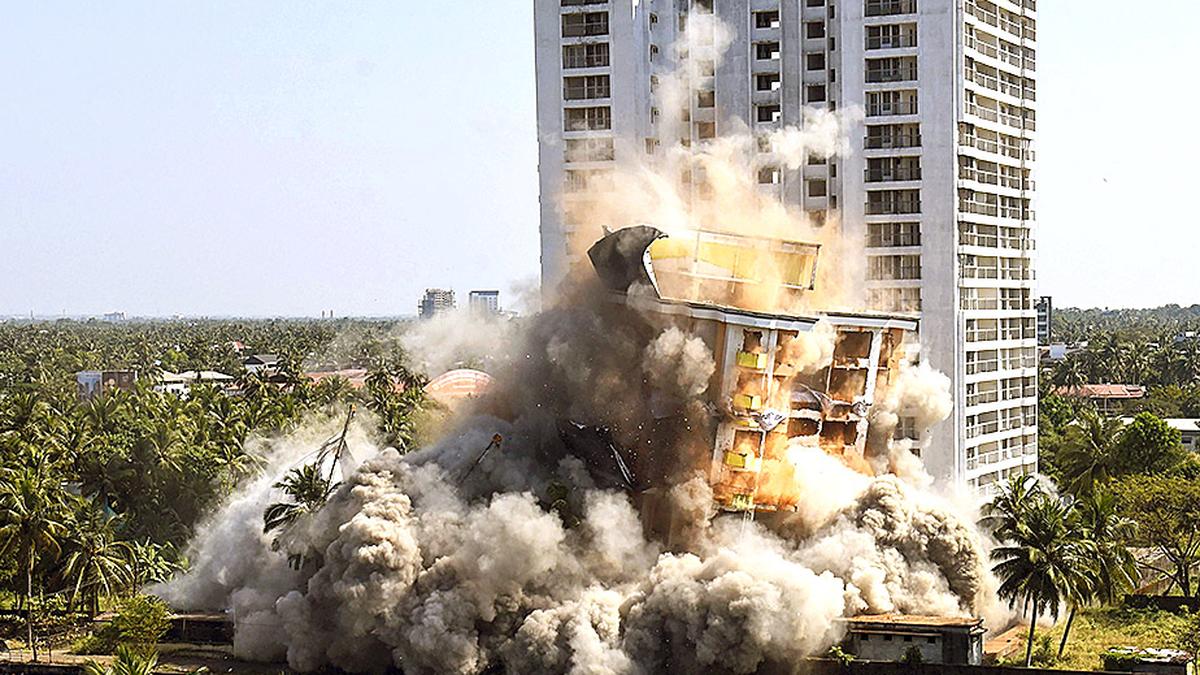
Kerala’s Maradu apartment case probe officer transferred out, only to be reinstated
The Hindu
Crime Branch probe into Maradu illegal apartments in Kerala takes curious turn; investigation officer transferred out, then brought back. Rex Bobby Aravin, DySP (Crime Branch), was leading probe against former officials of Maradu municipality & builders who illegally constructed apartments. CB invoked Prevention of Corruption Act against two former secretaries of Maradu municipality. SC ordered demolition of apartments & directed builders to pay cost & compensation to owners.
The Crime Branch (CB) investigation into the Maradu illegal apartment construction case in Kerala has taken a curious turn with the investigation officer being transferred out before the completion of the probe, only to be brought back later.
Rex Bobby Aravin, DySP (Crime Branch), who was leading the probe against former officials of the Maradu municipality and the builders who illegally constructed the apartments, was transferred out of the district to Crime Branch (Central Division), Thiruvananthapuram, in July. The transfer order came when the probe in two of the three cases was almost complete.
Fearing that the transfer of the investigation officer at a crucial time would derail the investigation and prosecution in the cases, some of the legal officers involved in the case approached top police officials and sought the continuation of his service, it is learnt.
Eventually, the Additional Director General of Police (Crime Branch) issued an order last week bringing back Mr. Aravin into the investigation of the case. The official has also been asked to take care of the case till the completion of the prosecution in the court.
Incidentally, the CB has invoked the Prevention of Corruption Act against two former secretaries of the Maradu municipality for abusing their official position to make undue monetary benefits to builders and themselves and thereby causing loss to the exchequer. The role of the builders and some civic authorities in conspiring with the secretaries of the Maradu municipality to illegally construct the apartment complexes in violation of the Coastal Regulation Zone Rules is also being probed, according to sources.
The apartment complexes – Jain Coral Cove, H2O Holy Faith, Alfa Serene and Golden Kayaloram – which came up at Maradu on the banks of Vembanad Lake were demolished in 2020 following an order from the Supreme Court. The court had also directed that the cost of demolition and the compensation awarded to the apartment owners shall be recovered from the builders.

“Writing, in general, is a very solitary process,” says Yauvanika Chopra, Associate Director at The New India Foundation (NIF), which, earlier this year, announced the 12th edition of its NIF Book Fellowships for research and scholarship about Indian history after Independence. While authors, in general, are built for it, it can still get very lonely, says Chopra, pointing out that the fellowship’s community support is as valuable as the monetary benefits it offers. “There is a solid community of NIF fellows, trustees, language experts, jury members, all of whom are incredibly competent,” she says. “They really help make authors feel supported from manuscript to publication, so you never feel like you’re struggling through isolation.”

Several principals of government and private schools in Delhi on Tuesday said the Directorate of Education (DoE) circular from a day earlier, directing schools to conduct classes in ‘hybrid’ mode, had caused confusion regarding day-to-day operations as they did not know how many students would return to school from Wednesday and how would teachers instruct in two modes — online and in person — at once. The DoE circular on Monday had also stated that the option to “exercise online mode of education, wherever available, shall vest with the students and their guardians”. Several schoolteachers also expressed confusion regarding the DoE order. A government schoolteacher said he was unsure of how to cope with the resumption of physical classes, given that the order directing government offices to ensure that 50% of the employees work from home is still in place. On Monday, the Commission for Air Quality Management in the National Capital Region and Adjoining Areas (CAQM) had, on the orders of the Supreme Court, directed schools in Delhi-NCR to shift classes to the hybrid mode, following which the DoE had issued the circular. The court had urged the Centre’s pollution watchdog to consider restarting physical classes due to many students missing out on the mid-day meals and lacking the necessary means to attend classes online. The CAQM had, on November 20, asked schools in Delhi-NCR to shift to the online mode of teaching.









